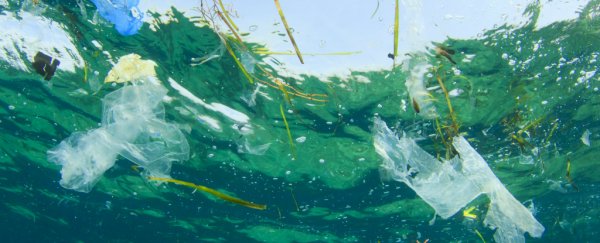The number of fish in our oceans will be outweighed by plastic waste over the next 35 years, according to a new report from the World Economic Forum (WEF). The announcement comes after a pretty bleak week for news, during which scientists told us all the aliens are probably dead, and South Africa moved closer to lifting its ban on domestic rhino horn trade.
The report revealed that almost a third of all the plastic we produce "leaks" into the environment, mostly ending up in our oceans, where it'll probably be eaten by wildlife or will eventually make its way into a great floating garbage patch.
The (sorta) good news is that it was released to coincide with the WEF meeting in Davos, Switzerland, where the organisation will be calling on more recycling and better solutions to the 'plastic problem'.
The WEF put the report together after analysing around 200 studies and speaking to 180 experts, and are going to use it to guide their discussions going forward.
What's perhaps most shocking is that, despite our attempts to cut down on plastic bags and invest in tupperware, our plastic use is still going up.
We're now making 20 times more plastic than we were 50 years ago - mostly for packaging - and that production is expected to double again in the next 20 years. "By 2050, we'll be making more than three times as much plastic stuff as we did in 2014," Sarah Kaplan writes for The Washington Post.
If that sounds bad, it's because it is - 95 percent of that plastic is thrown out after being used just once. And even though 14 percent of that waste is recycled, the rest either ends up in landfill or is tossed on the streets, before eventually making its way into our oceans.
It's time to rethink plastics https://t.co/79QekYO4dj #wef pic.twitter.com/YiDMGSQ26y
— World Economic Forum (@wef) January 19, 2016
All that equates to at least 8 million tonnes of plastic, or one garbage truck-full every minute, ending up in our oceans each year.
"If no action is taken, this is expected to increase to two [truck-fulls] per minute by 2030 and four per minute by 2050," the report said. "In a business-as-usual scenario, the ocean is expected to contain one tonne of plastic for every 3 tonnes of fish by 2025, and by 2050, more plastics than fish."
And it's not just the oceans that are suffering, as Kaplan reports:
"Plastic production accounts for 6 percent of global oil consumption (a number that will hit 20 percent in 2050) and 1 percent of the global carbon budget (the maximum amount of emissions the world can produce to prevent global temperatures from rising more than 2 degrees Celsius)."
So what can we do about it? That's something the WEF meeting will aim to tackle. But the one thing that's clear is that plastic is integral to so many different industries and parts of life, that there's not going to be a quick fix.
"To move from insight to large-scale action, it is clear that no one actor can work on this alone," said Dominic Waughray from the WEF. "The public, private sector and civil society all need to mobilise to capture the opportunity of the new circular plastics economy."
There are signs that this is starting to happen. Already the US is making moves to ban plastic microbeads - which wash straight out into our oceans - from soaps and bodywashes, and independent entrepreneurs are working hard to find alternatives to single-use packaging.
Let's hope that this latest report serves as enough of a warning sign to kickstart broader action.
